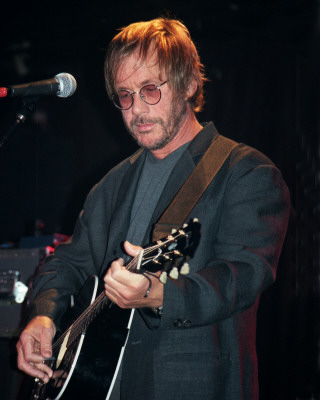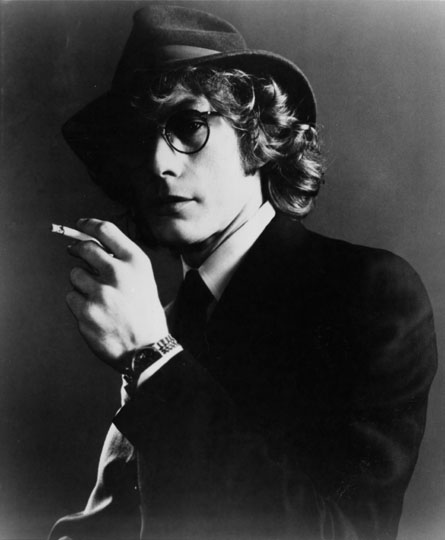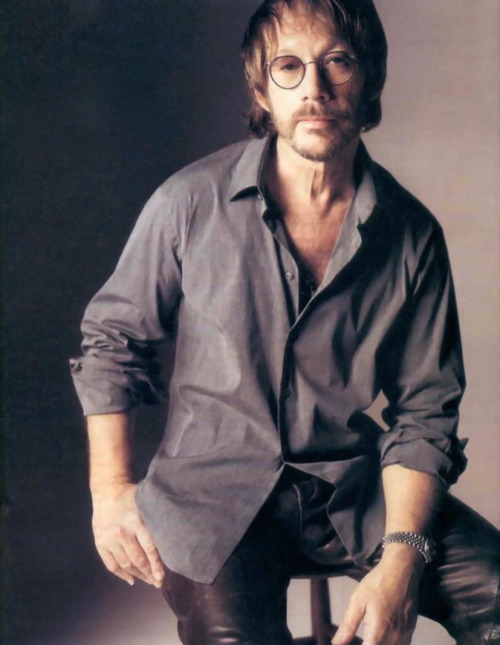| The Rolling Stones: Paint It, Black (released 7 May 1966) (read more)
The principal riff of “Paint It Black” (almost all classic Rolling Stones songs are highlighted by a killer riff) was played on a sitar by Brian Jones and qualifies as perhaps the most effective use of the Indian instrument in a rock song. The exotic twang was a perfect match for the dark, mysterious Eastern-Indian melody, which sounded a little like a soundtrack to an Indian movie hijacked into hyperdrive. |
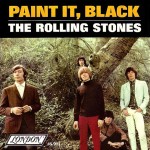 |
| Alice is an album by Tom Waits, released May 7, 2002 on Epitaph Records (under the Anti sub-label). The album contains the majority of songs written for the play Alice. The adaptation was directed by Robert Wilson, whom Waits had previously worked with on the play The Black Rider, and originally set up at the Thalia Theatre inHamburg in 1992. The play has since been performed in various theatres around the world. | 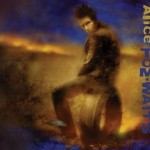 |
| Jimmy Lee Ruffin (born May 7, 1939) is an American soul singer, and elder brother of David Ruffin of The Temptations. He had several hit records between the 1960s and 1980s, the most successful being “What Becomes of the Brokenhearted”. | 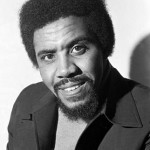 |
| Edward Thomas “Eddie” Rabbitt (November 27, 1941 – May 7, 1998) was an American singer-songwriter and musician. His career began as a songwriter in the late 1960s, springboarding to a recording career after composing hits such as “Kentucky Rain” for Elvis Presley in 1970 and “Pure Love” for Ronnie Milsap in 1974. Later in the 1970s, Rabbitt helped to develop the crossover-influenced sound of country music prevalent in the 1980s with such hits as “Suspicions” and “Every Which Way but Loose.” His duets “Both to Each Other (Friends and Lovers)” and “You and I”, with Juice Newton and Crystal Gayle respectively, later appeared on the soap operasDays of Our Lives and All My Children. | 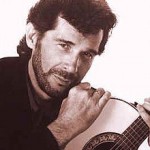 |
| My Ride’s Here is the eleventh studio album by American singer/songwriter Warren Zevon, released May 7, 2002. Zevon described it as “a meditation on death”; it was released several months before Zevon was diagnosed with terminal mesothelioma. | 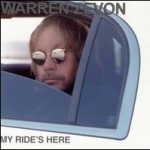 |
Spotify Playlist – May 7 |
|
Tag Archives: Warren Zevon
Today: The late Buddy Holly was born in 1936
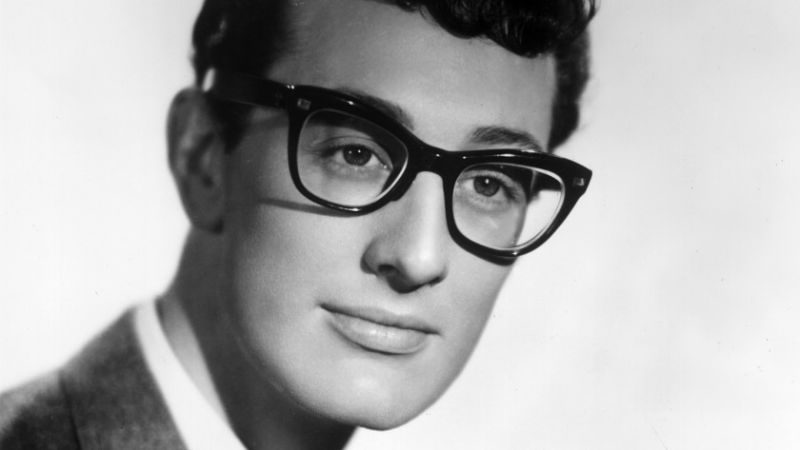
…Holly became the single most influential creative force in early rock & roll
~Bruce Eder (allmusic.com)
From Wikipedia:
| Birth name | Charles Hardin Holley |
|---|---|
| Born | September 7, 1936 Lubbock, Texas, U.S. |
| Died | February 3, 1959 (aged 22) Grant Township, Cerro Gordo County, Iowa, U.S. |
| Genres | Rock and roll, rockabilly,Lubbock sound |
| Occupations | Singer-songwriter, musician |
| Instruments | Vocals, guitar, piano, violin |
| Years active | 1955–1959 |
| Labels | Decca, Brunswick, Coral |
| Associated acts | The Crickets, The Picks |
Charles Hardin Holley (September 7, 1936 – February 3, 1959), known professionally as Buddy Holly, was an American singer-songwriter and a pioneer of rock and roll. Although his success lasted only a year and a half before his death in an airplane crash, Holly is described by critic Bruce Eder as “the single most influential creative force in early rock and roll.” His works and innovations inspired and influenced contemporary and later musicians, notably The Beatles, Elvis Costello, The Rolling Stones, Don McLean, Bob Dylan, and Eric Clapton, and exerted a profound influence on popular music. Holly was among the first group of inductees to the Rock and Roll Hall of Fame in 1986. In 2004, Rolling Stone ranked Holly #13 among “The 100 Greatest Artists of All Time”.
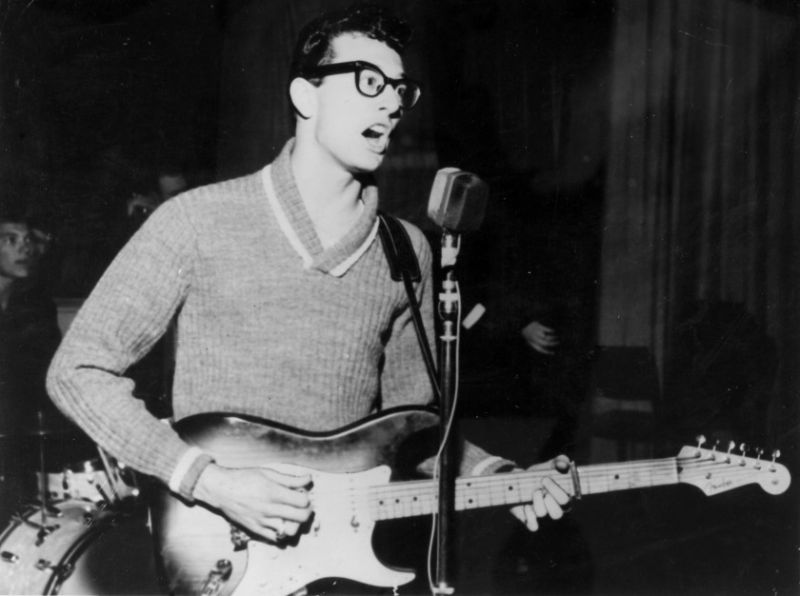
Holly saw Elvis Presley sing in Lubbock in 1955, and began to incorporate a rockabilly style, similar to the Sun Records sound, which had a strong rhythm acoustic and slap bass. On October 15, 1955, Holly, along with Bob Montgomery and Larry Welborn, opened the bill for Presley in Lubbock, catching the eye of a Nashville talent scout. Holly’s transition to rock continued when he opened for Bill Haley & His Comets at a local show organized by Eddie Crandall, the manager for Marty Robbins.
Following this performance, Decca Records signed him to a contract in February 1956, misspelling his name as “Holly”. He thereafter adopted the misspelled name for his professional career. Holly formed his own band, later to be called The Crickets, consisting of Holly (lead guitar and vocals), Niki Sullivan (guitar), Joe B. Mauldin (bass), and Jerry Allison (drums). They went to Nashville for three recording sessions with producer Owen Bradley. However, Holly chafed under a restrictive atmosphere that allowed him little input. Among the tracks he recorded was an early version of “That’ll Be The Day”, which took its title from a line that John Wayne’s character says repeatedly in the 1956 film The Searchers (GREAT film~Egil).
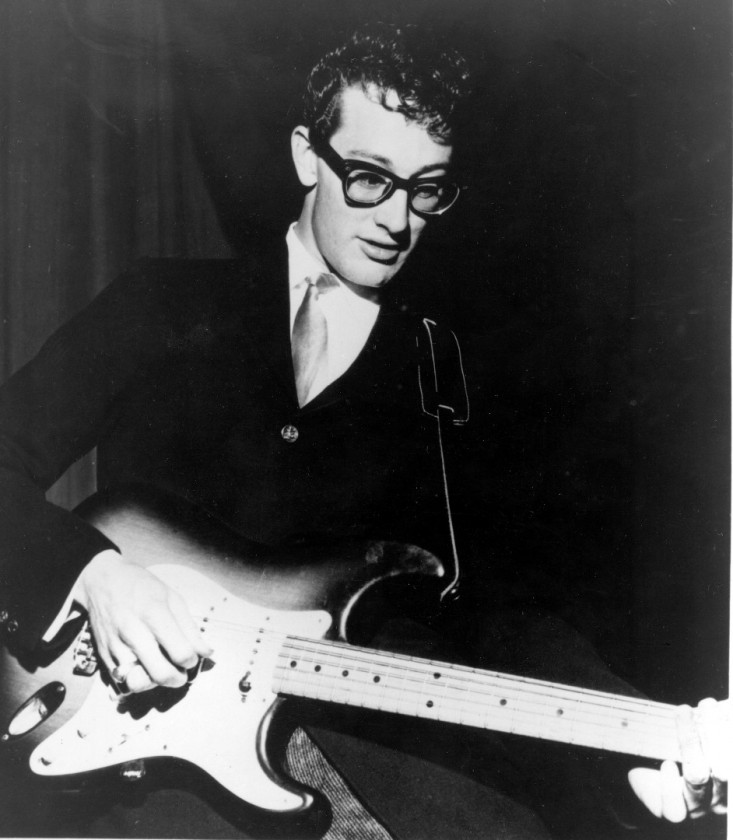
From allmusic – Bruce Eder:
Buddy Holly is perhaps the most anomalous legend of ’50s rock & roll — he had his share of hits, and he achieved major rock & roll stardom, but his importance transcends any sales figures or even the particulars of any one song (or group of songs) that he wrote or recorded. Holly was unique, his legendary status and his impact on popular music all the more extraordinary for having been achieved in barely 18 months. Among his rivals, Bill Haley was there first and established rock & roll music; Elvis Presley objectified the sexuality implicit in the music, selling hundreds of millions of records in the process, and defined one aspect of the youth and charisma needed for stardom; and Chuck Berry defined the music’s roots in blues along with some of the finer points of its sexuality, and its youthful orientation (and, in the process, intermixed all of these elements). Holly’s influence was just as far-reaching as these others, if far more subtle and more distinctly musical in nature. In a career lasting from the spring of 1957 until the winter of 1958-1959 — less time than Elvis had at the top before the army took him (and less time, in fact, than Elvis spent in the army) — Holly became the single most influential creative force in early rock & roll.
Read more @ allmusic
some Influence:
- A 17-year-old Bob Dylan attended the January 31, 1959, show, two nights before Holly’s death. Dylan referred to this in his 1998 Grammy acceptance speech for his Time out of Mind being named Album of the Year:
“And I just want to say that when I was sixteen or seventeen years old, I went to see Buddy Holly play at Duluth National Guard Armory and I was three feet away from him…and he LOOKED at me. And I just have some sort of feeling that he was — I don’t know how or why — but I know he was with us all the time we were making this record in some kind of way.”
- Keith Richards attended one of Holly’s performances, where he heard “Not Fade Away” for the first time. The Rolling Stones had an early hit covering the song.
- Holly influenced many other singers during and after a career that lasted barely two years. Keith Richards once said Holly had “an influence on everybody.” In an August 24, 1978, Rolling Stone interview, Bruce Springsteen told Dave Marsh, “I play Buddy Holly every night before I go on; that keeps me honest.”
- The Grateful Dead performed “Not Fade Away” 530 times over the course of their career, making it their seventh most-performed song. The song also appears on eight of their official live recording releases.
- Don McLean’s popular 1971 ballad “American Pie” is inspired by Holly and the day of the plane crash. The American Pie album is dedicated to Holly.
- On September 7, 1994 (Holly’s 58th birthday), Weezer released their single, “Buddy Holly”.
Peggy Sue (Arthur Murray Dance Party on December 29, 1957):
Album of the day – The Very Best of Buddy Holly:
Other September 07:
Continue reading Today: The late Buddy Holly was born in 1936
August 29: Warren Zevon released Sentimental Hygiene in 1987
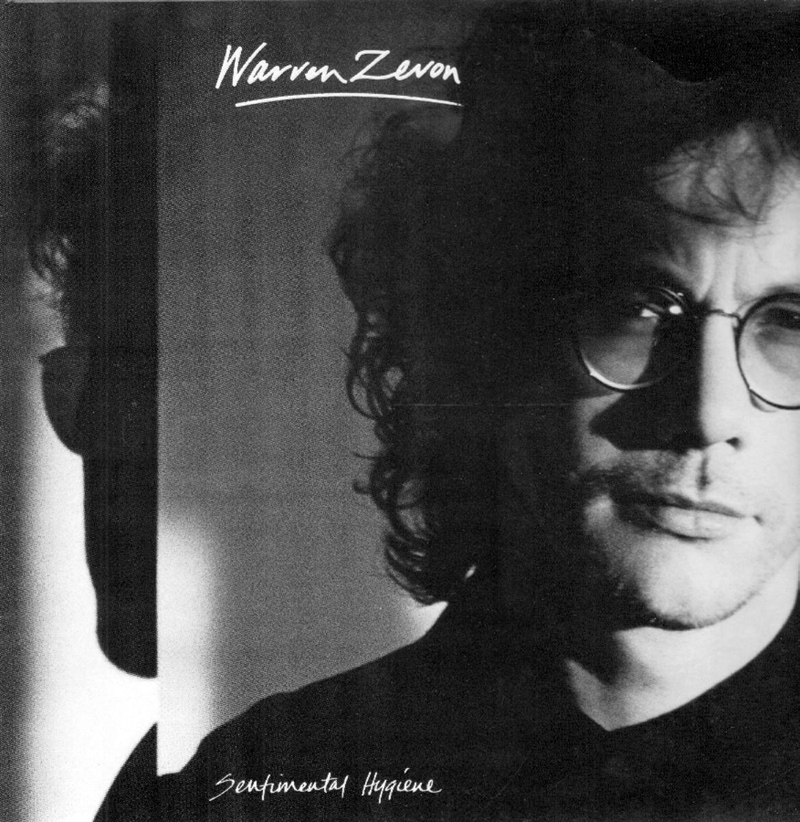
“I read things I didn’t know I’d done,
It sounded like a lot of fun.”
– Warren Zevon
“I write each song individually and each one calls for individual musicians, You sit around and wonder who can we get to play a Neil Young solo, and then you realize there`s a good chance you can get Neil himself.”
– Warren Zevon
Warren Zevon fell off the wagon after the release of The Envoy, he waited five years before releasing an album, the pause seemed to have done him good, as Sentimental Hygiene (released 29. August 1987) was one of his strongest albums.
Sentimental Hygiene was my first Warren Zevon record, I have since gotten everything I could find by him and about him, official as well as “un-official” releases, vhs, dvds and books. Warren Zevon has been a favorite of mine since Sentimental Hygiene met my ears.
There are lots of guests on the album, Bob Dylan, David Lindley, Neil Young, Brian Setzer, Don Henley and George Clinton, but the main players here are Peter Buck, Mike Mills, and Bill Berry of R.E.M. (and Michael Stipe also guested on a song…I think). They provide Zevon with a very solid back-up band, he sounds fresh and invigorated through the whole record. Warren Zevon sounded more rock’n roll than in quite a while, and he was introduced to a new audience (me included).
As always he was funny as hell!
Not on Spotify, but here’s a fine collection of songs off the album from YouTube.
Sentimental Hygiene (official video):
Continue reading August 29: Warren Zevon released Sentimental Hygiene in 1987
Today: The late Warren Zevon was born in 1947 – 66 years ago
We buy books because we believe we’re buying the time to read them
~Warren ZevonAll the salty margaritas in Los Angeles
I’m gonna drink ’em up
–
And if California slides into the ocean
Like the mystics and statistics say it will
I predict this motel will be standing until I pay my bill
~Warren Zevon (Desperados Under the Eaves)Few of rock & roll’s great misanthropes were as talented, as charming, or as committed to their cynicism as Warren Zevon.
~Mark Deming (allmusic.com)
the classic – Warren Zevon’s last Letterman Appearance:
Lawyers, Guns and Money (from BBC 1994):
Send lawyers, guns and money; the shit has hit the fan.
From Wikipedia:
| Birth name | Warren William Zevon |
|---|---|
| Also known as | Sandy Zevon Stephen Lyme |
| Born | January 24, 1947 Chicago, Illinois, United States |
| Died | September 7, 2003 (aged 56) Los Angeles, California, United States |
| Genres | Rock, Country rock, folk rock,Americana, hard rock, piano rock, blues rock |
| Occupations | Songwriter, musician |
| Instruments | Vocals, guitar, piano, harmonica |
| Years active | 1965–2003 |
Warren William Zevon (January 24, 1947 – September 7, 2003) was an American rock singer-songwriter and musician. He was known for the dark and somewhat bizarre sense of humor in his lyrics.
Zevon’s work has often been praised by well-known musicians, including Jackson Browne, Bruce Springsteen, Bob Dylan, and Neil Young. His best-known compositions include “Werewolves of London”, “Lawyers, Guns and Money”, “Roland the Headless Thompson Gunner” and “Johnny Strikes Up the Band”, all of which are featured on his third album, Excitable Boy (1978). Other well-known songs written by Zevon have been recorded by other artists, including “Poor Poor Pitiful Me” (a top 40 hit by Linda Ronstadt), “Accidentally Like a Martyr”, “Mohammed’s Radio”, “Carmelita”, and “Hasten Down the Wind”.
BF: Who are some of your favorite songwriters?
Bob Dylan: Buffett I guess. Lightfoot. Warren Zevon. Randy. John Prine. Guy Clark. Those kinds of writers.
~Bob Dylan (to Huffington Post – May 2009)
Hasten Down The Wind:
She’s so many women
He can’t find the one who was his friend
So he’s hanging on to half her heart
He can’t have the restless part
So he tells her to hasten down the wind
~WZ (Hasten down the wind)
Along with his own compositions, Zevon recorded or performed occasional covers, including Allen Toussaint’s A Certain Girl, Bob Dylan’s “Knockin’ on Heaven’s Door” and Leonard Cohen’s “First We Take Manhattan”. He was a frequent guest on Late Night with David Letterman and the Late Show with David Letterman. Letterman later performed guest vocals on “Hit Somebody! (The Hockey Song)” with Paul Shaffer and members of the CBS Orchestra on Warren Zevon’s My Ride’s Here album.
Live in Passaic NJ, 1982 (The Full Concert):
Album of the day
Warren Zevon (1976)
Other January 24
Continue reading Today: The late Warren Zevon was born in 1947 – 66 years ago
Wonderland music documentary – The LA scene 1977
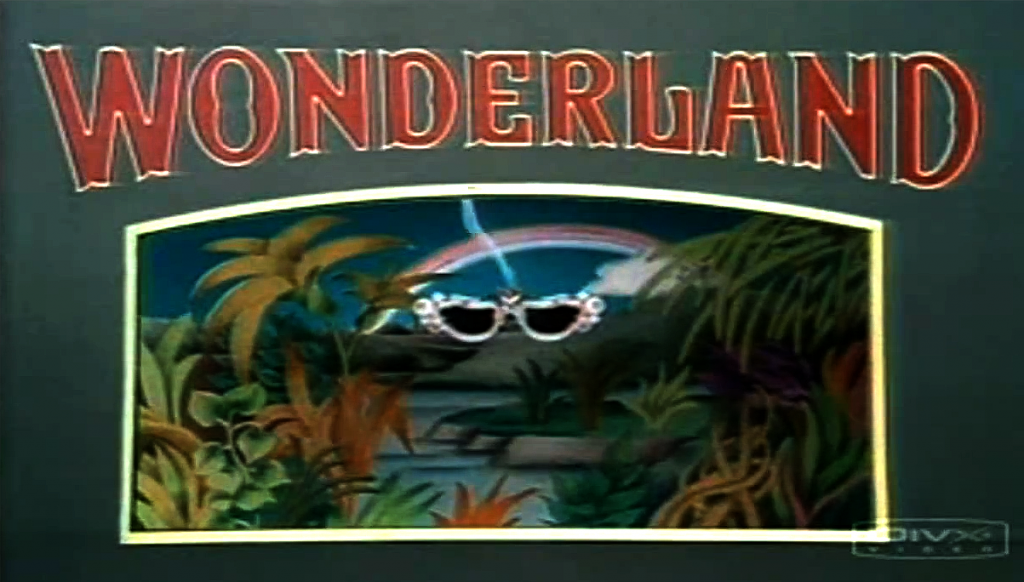
When I looked for songs on youtube for Jackson Brownes birthday I stubled upon this great documentary. This is why the web is so goddam cool, you can find long lost treasures, things you were certain was out of circulation or that you’ve never even heard of.
In 1977 the Dutch public broadcasting association VARA made a documentary called Wonderland, about then up-&-coming recording artists Warren Zevon, Linda Ronstadt, Bonnie Raitt & Jackson Browne. Here is that film.
Warren Zevon at Griffith Observatory, Linda Ronstadt in studio “Tracks Of My Tears” alternative studio version, Linda Ronstadt outside her Malibu house, Warren Zevon at a burrito stand, Warren Zevon in concert “Carmelita”, Bonnie Raitt at Frederick’s, Bonnie Raitt in concert “Nothing Seems To Matter”, Linda Ronstadt in the bedroom of her Malibu house, Linda Ronstadt in studio “Lose Again” alternative studio version, Warren Zevon at Griffith Observatory, Warren Zevon in rehearsal “Frank And Jesse James”, Bonnie Raitt in concert “Give It Up Or Let Me Go”, Jackson Browne in concert “Before The Deluge”.
– Hallgeir


